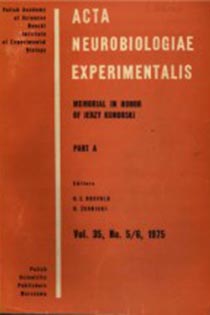Abstract
A review of experimental papers on the problem of incentive motivation reveals little or no support for the hypothesis that conditioned food signals facilitate autochthonous instrumental responses (i.e., responses motivated by the same drive and rewarded by the same unconditioned stimulus). The existing data are explained most parsimoniously by assuming that reward, or its conditioned signal, inhibits the central drive process, and, that the termination of either primary (food US) or secondary (food CS) reward causes the rebound of drive which energizes instrumental behavior. This post-consummatory arousal of drive retains some specificity related to the reward and is assumed to represent a mechanism of the phenomena usually referred to as incentive motivation.References

This work is licensed under a Creative Commons Attribution 4.0 International License.
Copyright (c) 1975 Acta Neurobiologiae Experimentalis
Downloads
Download data is not yet available.

